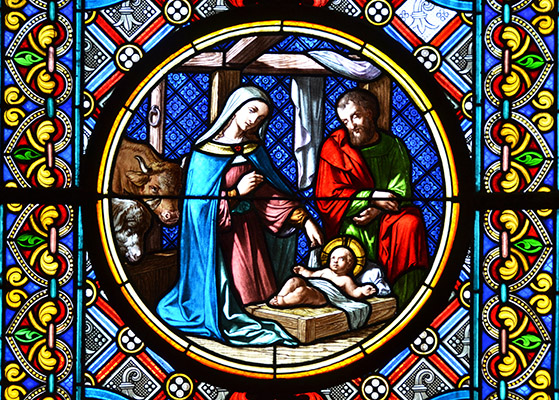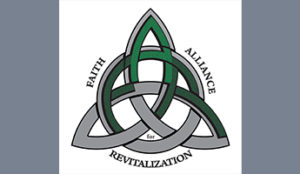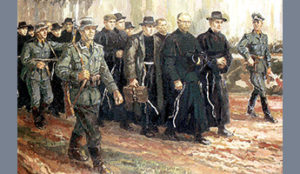He became human so that we might share in his divinity
The Mystery of the Incarnation is the Mystery the Human Person Transformed in Christ
The Franciscan theological instinct finds in the Incarnation a rich resource for a faithful reflection on the mystery of the human person before God and the world. For St. Francis, the incarnation expressed the profound humility of God and affirmed the holiness of all reality. God among us as a human being in Jesus Christ filled Francis with awe. His love of poverty as a relational reality emerges from his wonderment at the love God shows us by sharing his divine life with us in the incarnation. In the mystery of God made human in Christ, Francis intuits both the absolute poverty of the human person in isolation from God, and the abundant richness given to it in its consecration in holiness by Christ in the incarnation.
The mystery of the incarnation is called a mystery because it’s full meaning cannot be completely understood by the intellect; it must be absorbed into the heart and expressed by our lives for it to be truly understood. Our living into the mystery of God become human in Christ reveals the deeper relational significance of the incarnation for our understanding of the human person. The incarnation is the beautiful mystery of our God sharing fully in our human life and experience. That God chose to enter completely into our humanity and into the human condition speaks to us about both the nature of God and of the human person.
While it is true that God became human to save humanity from sin and eternal death, this is but one dimension of the mystery of the incarnation. Our theology, and hence our spirituality, tends so often to reduce the total mystery of the Christ-event to the final acts of Christ’s life – his death and resurrection. However, the salvation of the human person, and indeed of all creation, begins at the incarnation, in the ontological reality of God entering into the world, into history, and into the human condition. Salvation is first encountered in the very fact of the coming into being of Jesus Christ, God incarnate. And the reality of salvation begins to unfold in the existential reality of Christ’s life: his attitudes and relationships, his teaching and ministry, and the values he embodies in all this. Christ’s suffering, death, and resurrection occur within and as a consequence of his life-praxis.
This understanding opens us up to another dimension of the mystery of the Word made flesh, that in the incarnation God became human in Christ to show us how to be human. By becoming one with us through becoming one of us, God is saying “let me show you how to be human, how to be this wonderful and beautiful being that I have created in my image and likeness.” Our lives are filled with questions to which we have no final answers. These are questions about who we are, the meaning of it all, the immense suffering in the world, and so on. The increasing complexity of our social and technical life coupled with the diversity of competing worldviews confuse us and fill us with anxiety. The scale of suffering and injustice in our world both sadden us and confront us with our own helplessness to do anything meaningful to alleviate these evils. Our relationships are so often filled with tension and conflict. We yearn for excitement, we long for love and we seek meaning in our experiences. And, at depth, we seek an all-embracing and meaning-giving transcendence to fulfil the relentless yearnings in our hearts. How we go about meeting these needs, while bringing joy into our lives, so often also brings pain and sadness into our lives and that of others. In other words, we find it very difficult to simply be human.
In the incarnation, Jesus of Nazareth is God’s answer to every question we have about ourselves. When we speak about Jesus coming to teach and show us how to be human we do not simply mean this in its extrinsic and practical aspects. We mean it in a way that goes beyond the behavioural and imitative, but into the existential and transformational meaning of what it means to be a human person. While we certainly do learn from Jesus how to be compassionate and forgiving, just and peaceful, it is in his very being that we begin to discover the truth of our being. Our identity is to be found in his identity, and the truth of who we are before God is discovered in him. In the incarnation, God comes to meet us in our humanity. Those who seek God will not find him by trying to escape their humanity or human experience. God is not to be found in some distant and abstract ethereal realm far-removed from the messiness of human life; God is to be found through a generous embracing of our humanity and by entering more deeply into our human experience. When we begin to understand this, we begin to understand the mystery of Christ. When we come to some understanding of the mystery of Christ present in our own humanity we begin to glimpse the meaning of our existence and the purpose of our lives.
The central and defining feature of the incarnation and life of Christ is total self-giving in love. For St. Francis this dis-appropriating or self-emptying of God in the incarnation speaks profoundly of the humility of God, a humility which became the model and source of his own striving after minoritas and fraternitas. In the incarnation Christ disidentified with the prerogatives of divinity and took on the contingency of humanity; he lived in obedience to the will of the Father, disassociated from power and status, and gave of himself completely in service of others. Finally, on the cross, he poured out his life in an act of total self-giving to complete the act of love begun in the incarnation. He lived in love and lived for love. We, who are created in his image and likeness, are created in love and made for love. Our lives begin to take on a deeper value and realise their true dignity when we see that the total self-giving in love of Christ is precisely what we are called to imitate in our lives. The continuous outpouring of himself in compassionate healing and loving service was a natural consequence of his identity. The very same holds true for us. When we generously give of ourselves in loving service to others, not only do we begin to experience joy in our lives and peace in our hearts, we also discover the mystery of our own being. We come to the liberating insight that to be human is to love. It is from here that we begin to realise all our creative and transformative potentialities as a human person, and so follow Christ along the way that will ultimately lead us to share in his divinity, just as he shares in our humanity.
– friar Terence Bateman OFM Conv.





